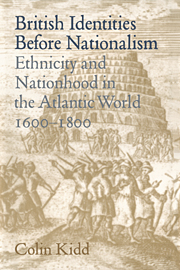Book contents
- Frontmatter
- Contents
- Acknowledgements
- Note
- List of abbreviations
- 1 Introduction
- Part I Theological contexts
- Part II The three kingdoms
- Part III Points of contact
- 8 Constructing the pre-romantic Celt
- 9 Mapping a Gothic Europe
- 10 The varieties of Gothicism in the British Atlantic world, 1689–1800
- 11 Conclusion
- Index
10 - The varieties of Gothicism in the British Atlantic world, 1689–1800
Published online by Cambridge University Press: 06 July 2009
- Frontmatter
- Contents
- Acknowledgements
- Note
- List of abbreviations
- 1 Introduction
- Part I Theological contexts
- Part II The three kingdoms
- Part III Points of contact
- 8 Constructing the pre-romantic Celt
- 9 Mapping a Gothic Europe
- 10 The varieties of Gothicism in the British Atlantic world, 1689–1800
- 11 Conclusion
- Index
Summary
The familiar association of Gothicism with English nationhood tends to obscure the importance of Gothic identities for other political communities in the British world. Although absorption in the Saxon past constituted one of the principal foundations of an assertive English nationhood, the significance of Gothicism was polymorphous and far from straightforward, especially in the eighteenth century. As well as defining the English core-nation, the rhetoric of Gothicism was also a salient feature of political culture in the various dominions of the eighteenth-century British monarchy. The Anglo-Irish political nation, the British colonists in North America and, from the middle of the eighteenth century, the people of Scotland celebrated a Gothic heritage of liberty, laws and institutions as a major component of their respective political identities.
Gothic identity was a vital ingredient of eighteenth-century British nationhood. The extension throughout the British Atlantic world of the cult of English libertarianism, including the view that England was the source of most of the freedoms enjoyed by the various British peoples, suggested a vital imaginative connection to the motherland. Moreover, the notion of an imagined Gothic community also reinforced the bonds of a common British identity. Yet Gothicism was no monolith. The sense of a shared ethnic history with England was not in itself a guarantee of an easy provincial relationship with the English core. As well as strengthening the process of British integration, the rhetoric of Gothicism also had the capacity to inject into political discourse a powerful solvent of imperial unity.
- Type
- Chapter
- Information
- British Identities before NationalismEthnicity and Nationhood in the Atlantic World, 1600–1800, pp. 250 - 286Publisher: Cambridge University PressPrint publication year: 1999



